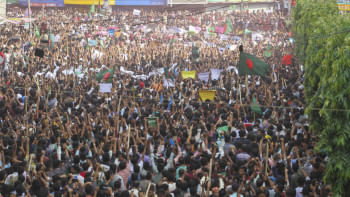Pappu Studio brings nostalgia to ‘Chobi Mela Shunno’

Anyone standing near Pappu Studio at "Chobi Mela Shunno'' will experience a childlike enthusiasm. The soothing seaside backdrop, the studio light setups and the little bench in front of the backdrop are inviting elements for people of all ages to recall their old album photographs and recreate special moments. All of this is arranged by Anwar Hossain Ashrafi. He is an aynawala and a sehrawala, but he proudly calls himself a chobiwala.
Marking Solidarity Day, students of the ninth batch of Pathshala honoured Ashrafi, also known as the Chobiwala of Bihari Camp Bazaar at "Chobi Mela Shunno''. A temporary studio was set up at the rooftop of DrikPath Bhobon, which not only allowed the audience to interact with the photographer, but also to get soaked in nostalgia. In a candid conversation, Ashrafi shared his story with The Daily Star.
In our region, studio photography has historic value. Ashrafi does not recall the specific time that he decided to be a photographer. Staring at the sky in an attempt to remember, he said, "I grew up in a family who had studio businessess in Khulna since the Pakistan period." His maternal uncle, Bhasha Shoinik Sameer Ahmed was his first mentor. Studio Focus, Photo Cine, Studio Glamour are his family studio names. However, he established his own place at the Bihari Camp Bazaar with the only photo studio of the camp--Pappu Digital Studio, named after his son. Ashrafi has been running the studio for the last fifteen years.
"There was a time when people would fancy being photographed in the studio. Times have changed, and everyone can take a selfie now. My work has been confined to passport-size photographs for the people in the neighbourhood," Ashrafi commented. In 1974, he travelled from Khulna to the capital in search of a comfortable future. He began working at Studio Venus in Shyamoli. He married a woman at the camp and stepped into a new path. "Photography was the only skill I had, and I gave it my all. Later, I worked with glass, frames and wedding requirements," Ashrafi asserted.
A Yashika D model camera with 120 films paved his ground as an apprentice in photography from his uncle, Haider Khalu. "The negative films had to be taken to the darkroom. We used five different chemicals for the development of images. We would also mix chemicals to make hypo in the final step in the processing. It was lengthy and difficult, the digital era is easier in some manner," said Ashrafi, who finds it odd to call himself an artist. "I needed money, I had a skill. For over fifty years, I've been working in this field to survive. My children are now motivated to use photography as an artistic tool, and I am happy about that."
Although his statement sounded like a confession what he said next had an artistic intervention. "My clients belong to a lower income class. They often come to me with an imagination of going to The Kaaba Sharif, The Tajmahal, or a romantic scenic location after their wedding. The smile on their faces after they receive their photos in those spaces that they might never be able to visit in person is priceless," shares Ashrafi. He recalls Bangabandhu as a young student leader visiting his uncle's place in Khulna. He remembers Mawlana Bhashani and the slogan Dike dike Agun jalo from his childhood. He recalls 1971 on a different note. "When the Pakistan army forced all Bengali-Biharis to carry identity cards, we went through a busy time taking photographs," Ashrafi said.

Born in Khulna, his extended family migrated to Bangladesh from Murshidabad during the partition period. His wife, who originates from Bihar, never had an issue of identity. He mentions that the people in the camp received their national identity cards from Bangladesh. They use Urdu, Hindi, and Bangla as per requirements, and see it as a means of communication. Ashrafi, however, recalls some moments of clashes from an outside force in the camp. "I am an impulsive photographer. Sometimes, I also get into trouble for taking pictures during risky times. My cameras have been broken and taken away. I was beaten and threatened. I did not have an intention of documentation. I concentrated on my work because otherwise, I would have to pay a heavy price," he said.
In answer to the question "does studio photography bring enough money?" Ashrafi offered a long list of the tasks he completed, from maintaining a family, to providing education for children and helping his siblings.
"I did it all from my income, I did not have to ask for anything from anyone else. I feel content," Ashrafi shares. His son Pappu and daughter Suma take after their father and practice studio photography, but through digital mediums. "My digital knowledge is negligible. My children, however, are doing well. If you want, they can even make you virtually fly to the moon!" he smiled.


 For all latest news, follow The Daily Star's Google News channel.
For all latest news, follow The Daily Star's Google News channel. 



Comments